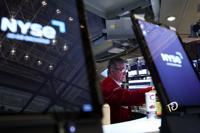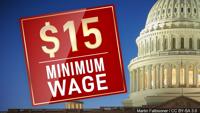New York (CNN) � US stocks plunged Friday and a broad selloff gripped Wall Street as investors digested slightly stubborn inflation data and weakening consumer sentiment while wrestling with continued tariff anxiety.
The Dow tumbled 715 points, or 1.7%. The broader S&P 500 fell 1.9% and the Nasdaq Composite slid 2.6%.
All three major indexes were on track to close the week in the red. The S&P 500 is down 5% since this year and on track for its first losing quarter since September 2023.
US stocks opened the day lower and began to slide as data from the Commerce Department showed inflation in February remained slightly sticky.
The Personal Consumption Expenditures index rose 2.5% year-over-year in February, unchanged from January and matching expectations. Yet the core PCE index, which strips out volatile categories like food and energy, ticked up to 2.8% year-over-year from 2.7% in January. That hotter-than-expected rise signals that inflation, while broadly cooling, remains above the Fed’s target of 2%.
Meanwhile, consumer sentiment tanked 12% this month, according to the University of Michigan’s latest survey released Friday.
The selloff gradually turned into a rout as investors dumped stocks in industries including technology, autos and airlines. Google () slid 4.4%, Stellantis () slid 4.3% and Delta Air Lines () slid 5.2%.
The stocks leading the blue-chip Dow lower included Amazon (), Nike () and Goldman Sachs ().
Lululemon () stock tumbled 15% on Friday after the company flagged concerns about the outlook for consumer spending on a call with investors.
“We also believe the dynamic macro environment has contributed to a more cautious consumer,� said Calvin McDonald, chief executive at Lululemon.
The selloff in major names wasn’t the only concern for investors.
CoreWeave, an AI venture backed by chip giant Nvidia, had a disappointing debut on the Nasdaq Friday, offering a meager outlook for both the AI boom and the market for initial public offerings.
CoreWeave had listed its IPO at $40, which was below its target range of $47 to $55, according to the Wall Street Journal. However, the stock began trading on Friday at $39, below that IPO price.
The poor debut is a sign of cooling enthusiasm for AI as investors continue to debate whehter the money being poured into AI is worth it. It also offers a bleak outlook for IPOs this year as markets sturggle to look past headwinds from tariffs.
Tariff anxiety continues to roil markets
Wall Street was also grappling with Trump’s announcement on Wednesday of 25% tariffs on all cars shipped into the US, set to go into effect April 3. Trump also announced tariffs on car parts like engines and transmissions, set to take effect “no later than May 3,� according to the proclamation he signed.
“It’s natural for people to expect higher prices because we haven’t seen a trade war like this since ,� Art Hogan, chief market strategist at B. Riley Wealth Management, told CNN’s Matt Egan.
Investors sold off stocks amid renewed anxiety about the impact of auto tariffs on the economy. Tariffs are a tax on imported goods, and economists expect Trump’s sweeping tariff proposals will cause an increase in consumer prices and drag on economic growth.
The yield on the 10-year Treasury note fell to 4.27% as investors snapped up government bonds, highlighting a risk-averse sentiment amid tariff uncertainty.
Wall Street’s fear gauge, the Cboe Volatility Index, or VIX, surged 10%. ticked into “extreme fear� territory, highlighting renewed anxiety among investors.
The tariffs on autos are an escalation in a trade war with the US� biggest trading partners, threatening to roil global markets and disrupt a across North America.
“While the economy appears solid, business executives are adopting a cautious stance on new investments, largely due to the Trump administration’s aggressive and unpredictable tariff policy,� said Matt Stephani, president of Cavanal Hill Investment Management, in an email.
Trump’s decision to announce the tariffs on autos ahead of the when reciprocal tariffs are set to be revealed � a date dubbed “Liberation Day� by the Trump administration � has stoked uncertainty on Wall Street. The early announcement highlights Trump’s commitment to tariffs, testing some investors� initial hope that they might only be a negotiating tactic.
“We think the proposed tariffs as announced would deliver a big hit to the auto industry, stoking higher costs, higher prices and a sharp decline in US sales,� said Solita Marcelli, chief investment officer for the Americas at UBS Global Wealth Management, in a note Thursday.
“[The] question is what these very aggressive automotive tariffs signal for next week’s announcement on both reciprocal and ex-auto sector tariffs,� Marcelli added.
Even if Trump’s reciprocal tariffs are not as “severe as initially feared,� market volatility could pick back up due to the auto tariff announcement, according to Marcelli.
“There is no doubt that just as yesterday’s market session was dominated by worries about tariffs, today’s session and the sessions until April 2 (“Liberation Day�) will also see traders preoccupied with tariffs,� said Thierry Wizman, global FX and rates strategist at Macquarie, in a Thursday note.
Wall Street’s outlook sours
Wall Street’s expectations for US stocks this year is being revised down amid continued announcements about tariffs.
Analysts at UBS on Friday trimmed their year-end target for the S&P 500 to 6,400 from 6,600.
Analysts at Barclays this week lowered their year-end target for the S&P 500 to 5,900 from 6,600. Goldman Sachs earlier this month lowered its year-end target to 6,200 from 6,500.
Ed Yardeni, president of investment advisory Yardeni Research, recently lowered his year-end target to 6,400 from 7,000.
Meanwhile, the most actively traded gold futures contract in New York on Friday surged above a record high $3,100. Gold is considered a safe haven amid economic turmoil and a hedge against potential inflation.
Goldman Sachs this week revised its year-end target for gold prices to $3,300, up from $3,100, underscoring how the yellow metal’s rise this year is expected to last amid economic and geopolitical uncertainty.
This is a developing story and will be updated.
The-CNN-Wire
� & © 2025 Cable News Network, Inc., a Warner Bros. Discovery Company. All rights reserved.
















